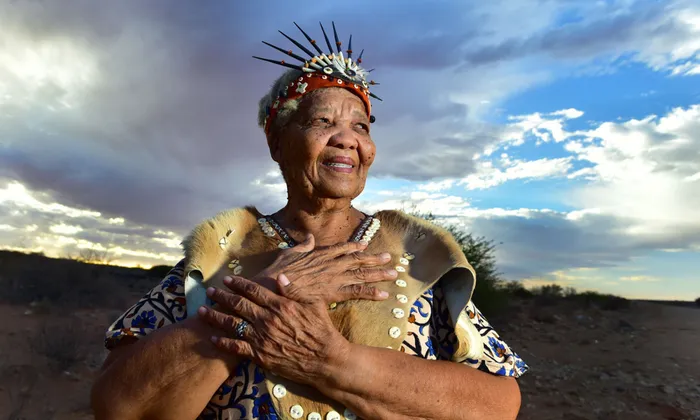Celebrating women as bearers of cultural heritage in Africa
Opinion

Ouma Katrina Esau, a national treasure and language activist who has dedicated her life to preserving the N|uu language and Khoi-San heritage. Cultural heritage is both a product and a process, always encompassing elements of the past, present, and future.
Image: Steve Lawrence/File
“We find ourselves historically distanced from the classics of our traditions. We find ourselves culturally distanced from those 'others' we have chosen both to ignore and oppress. We find ourselves distanced even from ourselves, suspicious of all our former ways of understanding, interpreting, and acting.” — David Tracy, Plurality and Ambiguity: Hermeneutics, Religion, Hope (1987).
AT A time when Africa risks discarding its profound cultural legacy, we have an opportunity to rethink our heritage. Our cultural memory is not a fixed, marketable product but a living, contested part of our past, present, and future.
Africa’s rich history offers invaluable lessons to navigate our current path forward.
Cultural heritage is both a product and a process, always encompassing elements of the past, present, and future. It provides a wealth of resources for current and future generations. This is not a passive transmission but an active process of acquisition, preservation, and interpretation.
New generations actively take on this legacy, deciding which marked parts to revive and interpret. Some elements are inevitably lost, while others are consciously eliminated if they contradict an established identity.
In this revitalisation, women have found a crucial niche. Historian Margaret Ripley Wolfe once noted that women were the “fallen leaves and missing pages” of history, whose stories needed telling. Today, women across diverse disciplines have heeded that call, playing an amazingly stupendous role as the primary bearers and transmitters of our cultural heritage.
Despite global challenges, women strive to maintain cultural identity, preserve heritage, and pass noble values to future generations. This role, though vital, is often overlooked in historical and cultural narratives. While heritage is increasingly used as a vehicle for development and sustainability in Africa, some forms remain untapped.
Culture nurtures the creative texture of our cities, tying people and places together through landmarks and traditions. It creates dynamic conditions for connection and innovation and is increasingly recognised for enhancing the quality of life and social cohesion.
A significant spoiler of this positive role, however, is the rampant spectre of Gender-Based Violence.
This article highlights the essential role women play — and must continue to play — in preserving and passing on cultural heritage amid globalisation. In traditional societies, women are central to rituals, oral traditions, arts, and cultural education. They maintain and transmit cultural practices through informal education and practical learning. This role can be further strengthened through community initiatives and awareness.
As inheritors of cultural values, women preserve culture by developing traditional skills and offering creative interpretations. Initiatives like cultural skills training, entrepreneurship development, and community groups can support them. With the growing commercialisation of heritage, much is expected from women to steer this trend positively.
Through the commodification of culture, women use these representations to promote their heritage for financial gain. Essential components of their lives, such as traditional dresses and daily domestic work, become performances for tourists. In this process, South African women can “perform” and “fashion” their heritage to reflect modern tastes, asserting their modernity while reaping financial benefits and promoting their culture.
The increase in tourism to rural areas such as KwaZulu-Natal, driven by a desire for “authentic” experiences, has created new opportunities. Tourists visit areas like the Drakensberg for excursions to archaeological and ecological sites. Women often “perform” their Indigenous identity and culture for these tourists, receiving financial gains while also promoting and preserving their heritage.
Destinations such as the Drakensberg, Underberg, Nkandla, and Ladysmith are magical tourist spots with significant economic potential. The opportunities for female entrepreneurship are vast. Vendors, predominantly women, sell embroidered dresses, sewn products, and handicrafts, often providing live demonstrations.
By wearing traditional dress, they become subjects of tourist photographs, embodying the heritage the visitors seek. These photographs serve as mementoes of an encounter with isiZulu, seSotho, or siSwati culture. In short, women vendors fulfil the tourist gaze, “performing” heritage to authenticate their products and increase sales.
Women also gain direct access by inviting tourists into their village homes. These homes are presented as “timeless” places where “ancient” traditions continue. Unemployed graduates could be trained as guides to facilitate these cultural exchanges.
Municipalities can support women by building traditional-style structures for demonstrations of “traditional” work, like processing natural resources or healing. Guides could then take tourists to local homes. These performances preserve cultural heritage by allowing guest participation.
While sometimes awkward, they allow women to form deeper connections with tourists, showcase their products, and command higher prices than they would from a vendor. This direct interaction enables financial gain and cultural preservation.
It is time for women to assert their modernity by savvyly utilising commodified aspects of their heritage for financial gain. By “performing” cultural heritage — selling handicrafts or demonstrating traditional work in domestic spaces — they control the narrative. They know what tourists want to see and are proud to share it.
While these encounters are transactional at their root, they provide a powerful opportunity for the promotion and preservation of cultural heritage.
Everyone must be involved in preserving and promoting our cultural heritage. There is an urgent need to bring African cultural values back into the limelight. All heritage stakeholders must play a role in revamping an African cultural heritage that has been badly bastardised and almost devastated by colonialism and its attendant force of westernisation.
* Dr Vusi Shongwe works in the Department of Sport, Arts, and Culture in KwaZulu-Natal and writes in his personal capacity.
** The views expressed here do not reflect those of the Sunday Independent, IOL, or Independent Media.